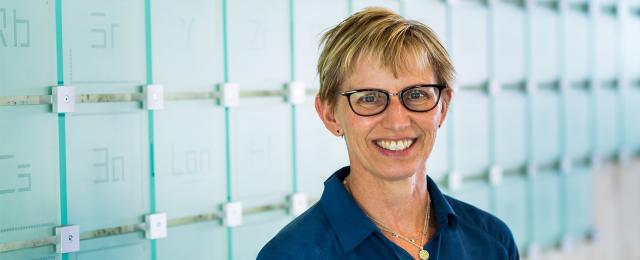Abstract:
Microbes can foster human health or cause disease. Humans can maintain a functional microbiome yet avoid the propagation of pathogenic microbes. How they accomplish this feat is unclear. Intriguingly the human-microbial interface is rich in glycans— from the carbohydrate coats of microbes to highly glycosylated mucins that make up our mucus. Our goal is to understand how this carbohydrate language is built and read. This seminar will focus on elucidating carbohydrate-protein interactions, mimicking the critical mucins at these barriers, and using them to control microbes. Our findings can result in new strategies to combat pathogens, rapid methods to characterize microbial communities, and methods to regulate microbiome composition to promote human health.
Bio:
Laura Kiessling is an institute member of the Broad Institute of MIT and Harvard, and the Novartis Professor of Chemistry at MIT. She develops and implements methods to investigate cell surface glycans, including the use of polymer chemistry to generate glycoprotein and mucin mimics. Her interest in cell surface carbohydrates extends to their roles in immunity, development, and in control of the human microbiome. She also applies insight into protein-glycan interactions to develop new strategies to control microbial infection. Kiessling is a member of the American Academy of Arts & Sciences, the American Academy of Microbiology, the American Philosophical Society, and National Academy of Sciences. She is the founding editor-in-chief of the journal ACS Chemical Biology. She is the founding Editor-In-Chief of the journal ACS Chemical Biology. She is an author of over 140 peer-reviewed journal articles, and an inventor on more than 28 US patents. She is a member of the Research Advisory Board of GlaxoSmithKline, the Yale University Council, and the Council of the National Academy of Sciences. Her honors and awards include a MacArthur Foundation Fellowship, a Guggenheim Fellowship, the ACS Gibbs Medal, and, most recently, the Tetrahedron Prize. She has advised approximately 100 graduate students and post-doctorates. Alumni from her research group are contributing through their positions as faculty members of distinguished research universities, medical schools, and colleges, and as research scientists at innovative start-up companies, leading corporations, and government laboratories. Professor Kiessling received an Sc.B. degree in chemistry at MIT, where she performed undergraduate research in organic synthesis with Professor Bill Roush. She received a Ph.D. degree in chemistry at Yale University for her research with Stuart L. Schreiber. She was an American Cancer Society postdoctoral fellow with Peter B. Dervan at California Institute of Technology. She then joined the faculty at the University of Wisconsin–Madison, where she became the Steenbock Professor of Chemistry, the Laurens Anderson Professor of Biochemistry, and the Director of the Keck Center for Chemical Genomics. In 2017, she returned to MIT as the Novartis Professor of Chemistry. Professor Kiessling is a member of the American Academy of Arts & Sciences, the American Academy of Microbiology, the American Philosophical Society, and National Academy of Sciences. She is the founding Editor-In-Chief of the journal ACS Chemical Biology . She is an author of over 140 peer-reviewed journal articles, and an inventor on more than 28 US patents. She has advised approximately 100 graduate students and postdoctorates. Alumni from her research group are contributing through their positions as faculty members of distinguished research universities, medical schools, and colleges and as research scientists at innovative start-up companies, leading corporations, and government laboratories.
Speaker:
Institution:
Location:

